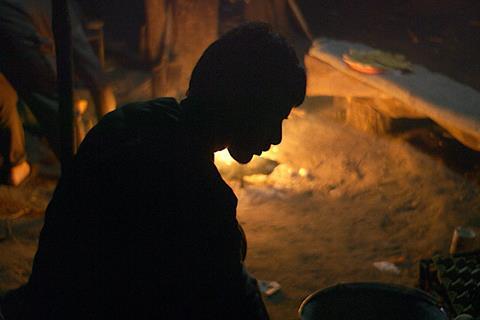Uncompromising Venice Critics Week title will reward patient viewers

Dirs: Federico Cammarata, Filippo Foscarini. Italy. 2025. 78mins
The debut feature of directors Federico Cammarata and Filippo Foscarini is an uncompromising documentary that embeds the viewer with Afghan people smugglers operating on the border between Serbia and Hungary. Mostly unfolding in stygian gloom, it is a challenging production that rewards patient viewers, a truly immersive experience that ultimately reveals human stories and emotions confined to the nighttime shadows. Some further festival exposure, especially at events with a human rights focus, should follow a world premiere in Venice’s Critics Week.
Intent on conveying the reality of a particular place and time
Cammarata and Foscarini previously collaborated on the 50 minute film Tardo Agosto (2021) which captured the impact of a suffocatingly hot summer on the island of Sicily, and Waking Hours is just as intent on conveying the reality of a particular place and time. It begins in the pitch black as a static camera stares into the distance. An occasional light dances in the darkness; a flickering red glow might be a flame.
Then, a stentorian warning blasts out that this is the Hungarian State Border, an area equipped with an electrical protection system. Genuine asylum seekers are advised to make their claim at the Hungarian embassy outside the Schengen area. Flashes of lightning are followed by the crackle of rain, and we start to hear voices calmly discussing the weather and lamenting the cold.
Cammarata also serves as the cinematographer here, and he rarely moves the camera as we remain in the dark, hoping to capture any noise or activity. His approach demands complete concentration. We hear footsteps, a dog barking and what could be a gunshot. Faces are rarely shown. The camera eavesdrops on conversations about transportation, safe routes, costs and a host of practical matters. It almost sounds as if the men are operating a travel agency from their makeshift tent in the forest. There is some wry amusement in the judgments passed on potential European destinations. Italy is praised for its compassion whilst Germany earns the scorn of one man who declares; “All the jobs and the system in Germany suck.”
Around the halfway point, the film moves towards the light, approaching a campfire like a stray dog gaining in confidence. The reward is the chance to get closer to some members of the Afghan clan and hear their stories. Amanullah previously worked for the Afghan government before having to leave, and spent years in Iran and Turkey. As Amanullah rolls out dough and bakes bread, we learn more of his story. Under a massive moon that takes up almost the whole of the frame, we also hear a young man reveal that he has been to every country in the Schengen zone but now prefers Serbia and a life in the forest. ”You always find someone who needs help crossing the border,” he reveals.
Cammarata and Foscarini wisely restrict Waking Hours to a trim running time. There is a warm beauty in the glow from the campfire and in the tenderness of the storytelling; personal stories confided to the camera are the highlight. These are rare moments of human connection in which we learn something personal about the faceless individuals who help to smuggle desperate people across the border. Then, we return to the darkness, the dripping rain, the cold and the distant sound of another gunshot.
Production company: Volos Films Italia, Cosma Film
International sales: Luminalia tomasso@luminaliafilm.com
Producers: Federico Cammarata, Filippo Foscarini, Serena Alfieri, Stefano Centini, Roberto Minervini, Dario Zonta
Cinematography: Federico Cammarata
Editing: Federico Cammarata, Filippo Foscarini























